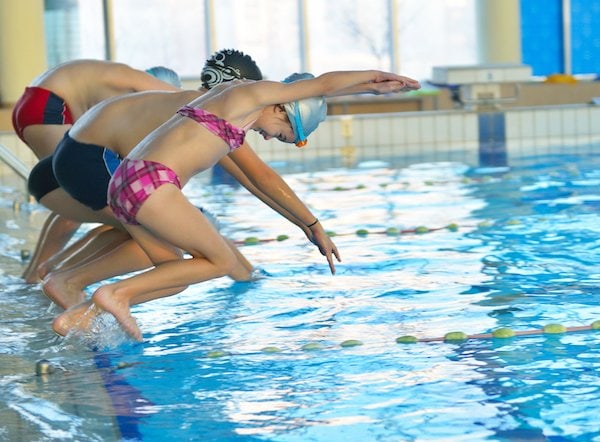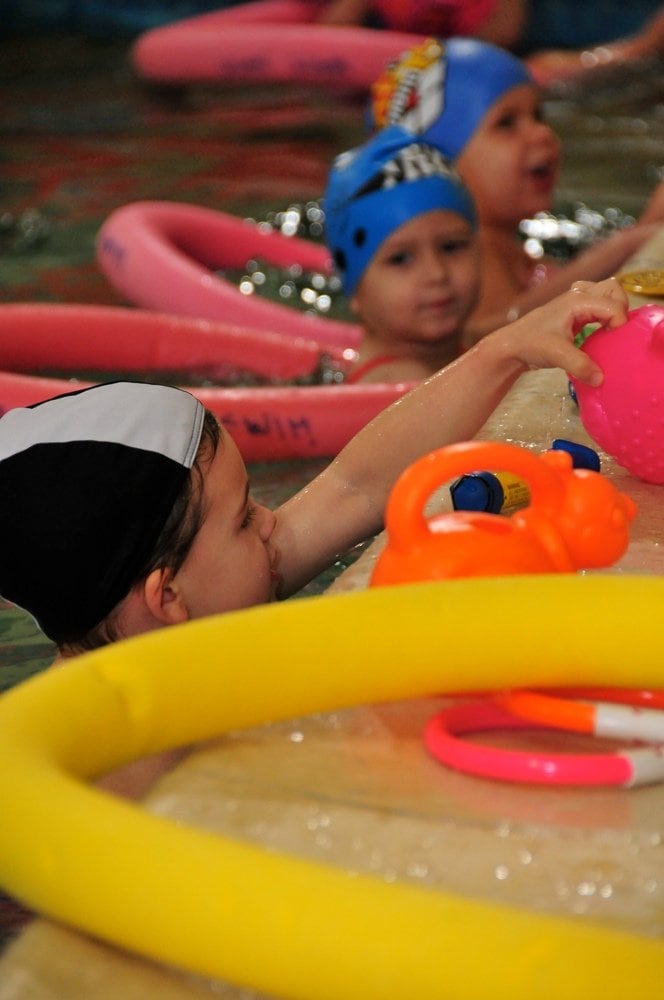To grow and develop, children need time and space to be active and play safely. Swimming pools are great environments for children to play freely and all sort of activities; jumping; diving, kicking, etc.

Sir Ken Robinson, British author, speaker and international advisor on education, once said ‘academic research shows that active play is the natural and primary way that children learn.’ He explains later that: ‘Play is a highly beneficial and deeply natural way in which kids learn… Play has deeply important roles in the development of intellectual skills, in social skills, in developing empathy, in stretching our imaginations and exploring our creativity.’ Unfortunately, the general perception of playtime is far away from scientific facts- play has been misunderstood.
It’s very common for parents to think of ‘Play’ as a fun activity with no substantial educational value.
Many adults are O.k with children playing in their spare time and to keep themselves busy when there is nothing else going on. But, it is not O.k for children to play when seriously learning should be happening. Is this you? So read more….
Because, in this blog, I want to explain the true value of playing and the importance of adding ‘Play’ in learning specially in the context of swimming.

‘Play is not a break from learning. It is endless, delightful, deep, engaging, practical learning. It’s the doorway into the child’s heart.’ ~ Vince Gowmon
‘Play’ it is NOT a waste of time- it is essential for bringing up happy and healthy children.
Play added into swimming lessons brings an element of fun into learning. It also deepens the learning and increasing engagement with children.
And, these days we really do need to keep children engaged and here is why:
In the last three decades, children have become considerably less active. Children’s lack of physical activity has become a major concern specially in big cities like London. Although many educators and academics have been saying for several years that play matters for children’s development and learning, a recent survey has shown that 75% of British children spend less time outside than a prison inmate per day.
Time spent playing in parks, woods and fields have shrunk dramatically due to lack of green spaces, digital technology and parents’ fears.
A UK research by Peter Blatchford at the Institute of Education showing that in the UK, outdoor play in schools has been cut in half in recent years. That’s why these days children are spending far too much time sitting down and being physically inactive. Our body and brain design, specially in children, are for being up and about, moving, doing practical activities- simply playing.
For children who come to Blue Wave Swim School’s swimming lessons, our primary goal is to use the ’30- min’ weekly lesson time to teach kids swimming.
I think swimming lessons could be a perfect set-up for mixing serious learning and play. And here is why:
Swimming is a complex sport and teaching it is very technical. So, adding play can really compliment lessons and make them more interesting. actually based on more than 25 years of teaching swimming I know mixing teaching technique with play by adding carefully designed games can be winning formula for teaching swimming.
It is very much the case for toddlers and pre-schoolers who do swimming lessons. With a very short attention span, by adding play into swimming lessons for younger children, the level of engagement goes up massively.
We keep the engagement high by keeping children interested in the process of learning to swim through play and toys. Teaching this way is far more effective than old-fashion traditional swimming lessons which are mainly focused on teaching technique and some children find very boring.
These days swim teachers cannot just expect children to stay engaged during lessons and be attentive all the time.

The younger the children are in swimming lessons, the more important ‘play’ part is. Obviously, adults are less appreciative of having play in lessons- adults normally prefer ‘serious learning’.
In our swim school, specially for younger children like toddlers and pre-schoolers, we use play and games a lot.
Over the years, we have noticed, how much more children are learning through meaningful and well-designed games. Swimming teachers can keep kids engaged very effectively without teaching standards dropping.
Parents tells us with games and play, we have managed to change ‘I don’t want to do swimming’ to ‘when am I going to my swim lesson again’. A delightful shift!
However, the play element of swimming lessons has to be designed so well that it doesn’t compromise the learning part of the swimming lessons. And, that is where the level of expertise and experience of swimming teachers really matter.
Games are fun and playing keeps children active. Play can also provide learning opportunities for children across different age groups. But, only knowledgeable swimming teachers can know how to implement games and play into swimming lessons without compromising the standard of teaching.